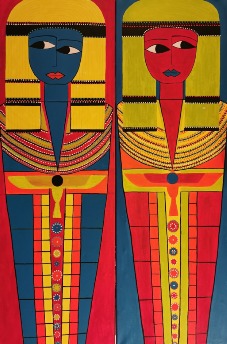Open Access Publication in the Spotlight (March) - 'Is a Mummy a Person or a Property: The Classification and Choice of Law of Cultural Objects in Private International Law'

Each month, the open access team of the University of Groningen Library (UB) puts a recent open access article by UG authors in the spotlight. This publication is highlighted via social media and the library’s newsletter and website.
The article in the spotlight for the month of March 2022 is titled Is a Mummy a Person or a Property: The Classification and Choice of Law of Cultural Objects in Private International Law , written by Zhen Chen (Faculty of Law).
Abstract
In the Buddha Mummy Statue case, the Chinese village committees sued the Dutch defendants for the return of a stolen golden statue that contains a mummified Buddha. The parties had different opinions on the legal nature of the mummy contained in the statue. The Chinese court classified the statue as a cultural property and applied the choice of law over movable properties provided in Article 37 of the Chinese Private International Law Act (lex rei sitae). Based on a comparative study, this article argues that a mummy does not fall within the traditional dichotomy between a person and a property. Instead, a mummy should be classified as a transitional existence between a person and a property. If the classification of a mummy has to be confined to the traditional dichotomy, a mummy can be regarded as a quasi-person or a special kind of property. Following this new classification, a new choice-of-law rule should be established. In this regard, the Belgian Private International Law Act, which adopts the lex originis rule, supplemented by the lex rei sitae rule, is a forerunner. This article advocates that the adoption of the lex originis rule may help to stop the vicious circle of illegal possession of stolen cultural objects and facilitate the return of stolen cultural objects, especially those containing human remains, to their country of origin.
We asked author Zhen Chen a few questions about the article:
This article was published open access, was open access a deliberate choice?
Yes, it was. Since I knew the possibility of publishing open access articles via a workshop organized by our library, I have decided to publish my articles only as open access articles in the future, unless it is not possible. I think publishing open access is beneficial for so many reasons. First, I have experienced the difficulty of acquiring an article which has limited access, so I don’t want others who want to read my article to have the same struggle. Open access publication ensures that anyone, in and outside academia, who is interested in the topic can read it. Second, some research questions are of social and cultural importance, open access publication of research results may raise the awareness of a problem or challenge in the general public. Third, open access publication can also enhance the academic impact and facilitate personal development of the researcher in the long term.
How easy or difficult is open access publishing in the field of law? Are there enough open access publishing options available?
I would say it is not difficult to publish an open-access article in the law field, as long as you choose the right journal. There are already many journals that offer 100% Article Processing Charge (APC) discounts for UG and UMCG authors. Still, not all journals are open access. It is better to check on the university website first before submitting your article to a journal. For instance, I always would like to submit my articles which compare Chinese law and European law to the Hong Kong Law Journal. Since this journal has no agreement with our university, it is currently off my journal list.
In your spare time you like to paint, some of your paintings are now on display at the Law Faculty. Two of your paintings are titled 'The Egyptian Mummies'. Were you inspired by the Buddha Mummy Statue case? What does this case mean to you?

Indeed, my paintings titled 'The Egyptian Mummies’ are directly inspired by the article I wrote about the Buddha Mummy Statue case. For me, this case reminds me of the old days when my grandma took me to a Buddha temple to pray every weekend. Although that temple only enshrines several Buddha statues without containing mummies of deceased Buddhists, I knew how important it is for my grandma and the local community. So, I can imagine the social, cultural, religious and spiritual importance of a 1,000-year old mummified Buddha for the local people. Since the moment I learned about the legal dispute between the Chinese village committees and the Dutch collector about the stolen Buddha Mummy Statue in 2018, I have kept an eye on it until a judgment was issued by the Chinese court in 2020. My current PhD research is about consumer protection in the digital age. Because of this case, I have decided to conduct Postdoc research on the restitution of stolen cultural objects after my graduation (hopefully, this year).

I hope that my paintings exhibited at the Transboundary Legal Studies (TLS) department may also raise the awareness of the general public, especially those who might be potential good-faith buyers, on the issue of stolen cultural objects. After all, we human beings are cultural beings. Our cultural identity is largely defined by our cultural objects. The theft of cultural objects from a country is also the theft of people’s identity and collective memory of that country. Therefore, the return of stolen cultural objects concerns each of us, especially in this globalized world.
Could you reflect on your experiences with open access and open science in general?
My experience with publishing open access is positive. The staff of our library is very supportive and responsive to the questions over open access publication. If you have any questions about it, you can send an email to openaccess rug.nl. Besides, my advice is to make a list of open access journals in your field and submit your article based on the objective and targeted audience of the journal.
Useful links:
Visit the exhibition of paintings by Zhen Chen at the Transboundary Legal Studies (TLS) department.
The Buddha Mummy Statue case: the Guardian provides a description of the case, just like the NOS (in Dutch). An analysis of the verdict by the Chinese court is also available.
Webinar ‘How to publish open access’: one-hour webinar organized regularly by the UG Library that provides a comprehensive introduction to open access (OA) publishing
Open access journal browser: search engine that can be used to check if a discount on the article processing charge (APC) is available for a specific journal. UG corresponding authors can publish with an APC discount (mostly 100%, so for free) in more than 12.000 journals!
Citation:
Zhen Chen, Is a Mummy a Person or a Property: The Classification and Choice of Law of Cultural Objects in Private International Law, The Chinese Journal of Comparative Law, 2022, https://doi.org/10.1093/cjcl/cxac006
If you would like us to highlight your open access publication here, please get in touch with us.


